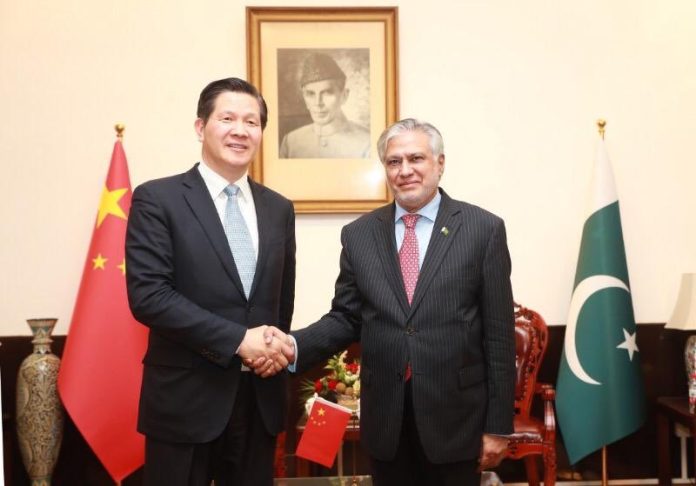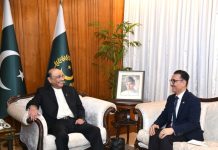——- Hails contribution of Gezhouba Group company
——- Expresses condolences with Chairman over tragic Shangla incident
——- Meets Chinese investors
——- Asserts Pakistan offers lucrative manufacturing, processing opportunities to foreign investors
From Mahnoor Makhdoom
Beijing: Deputy Prime Minister and Foreign Minister Mohammad Ishaq Dar on Monday invited the Chinese Gezhouba Group to expand its operation in Pakistan under the second phase of China Pakistan Economic Corridor (CPEC). “Under the Phase-II of CPEC, Pakistan offers generous incentives to Chinese investors which the Gezhouba Group can use to expand its business footprints in Pakistan,” he said while talking to the Chairman of Gezhouba Group in Beijing.

The Gezhouba Group is a subsidiary of Energy China, which is China’s leading company undertaking multiple power generation projects in Pakistan, a press release issued by the Foreign Office said. The Deputy PM expressed condolences to the Chairman at the tragic incident in Shangla in which 5 Chinese and 1 Pakistani national were martyred. He expressed Pakistan’s firm resolve to bring the perpetrators of this heinous attack to justice and to assure fool-proof security of Chinese nationals in Pakistan. Noting the contribution of Gezhouba Group to Pakistan’s economic development, the Deputy PM underscored that Pakistan needed to further expand its power generation capacity in renewable and hydel sectors for which Gezhouba Group can play a leading role. The Chairman thanked Pakistan for taking effective steps to ensure the security of Chinese nationals in Pakistan and expressed firm resolve that the company would timely complete all its projects in Pakistan and would further expand operations to new areas of cooperation.
Meanwhile, Deputy Prime Minister and Foreign Minister Ishaq Dar on Monday, outlining the investor friendly policies of the government, invited the Chinese companies to set up manufacturing and processing units in Pakistan. He was talking to Mayor of Shoguang, Zhao Tianbao who called on him in Beijing, China.
The Deputy PM highlighted Government of Pakistan’s reform agenda in the economic domain and shared an overview of the opportunities for Foreign Direct Investment (FDI) in diverse sectors of Pakistan including infrastructure development, renewable energy, textiles, agriculture, IT and mining, according to a press release issued by the Foreign Office. Mayor Zhao Tianbao expressed its gratitude to the Deputy PM for providing them the opportunity to engage in a fruitful exchange of views and share ideas, and reaffirmed their commitment to further strengthening the trade and economic ties between China and Pakistan. He also emphasized the determination to continue exploring new avenues of cooperation in the fields of agriculture, mining and energy, through investments aimed at achieving shared prosperity and development of the two countries.
On the other hand, Deputy Prime Minister and Foreign Minister Mohammad Ishaq Dar on Monday met with Vice President of Minmetals and Chairman of Metallurgical Cooperation of China, Chen Jianguang in Beijing and invited to invest in Pakistan under China Pakistan Economic Corridor (CPEC). During the meeting, he underscored that the second phase of the CPEC aimed at enhancing business-to-business (B2B) collaboration between the private enterprises of the two countries.
He added that CPEC provides Minmetals and MCC with access to modern transport infrastructure to enhance logistical efficiency and reduce transportation costs for both raw materials and finished products. Ishaq Dar appreciated the longstanding partnership of Pakistan with Minmetal and MCC and their contributions in executing important mining projects in Balochistan, a Foreign Office press release said. The Deputy PM underlined that export of copper to China from Pakistan has increased exponentially, reaching US$ 1.22 billion in 2022 from US$ 132 million in 2018. Deputy Prime Minister Dar also invited the companies to establish processing plants in Balochistan to produce value-added mineral products for domestic consumption and exports to China.




